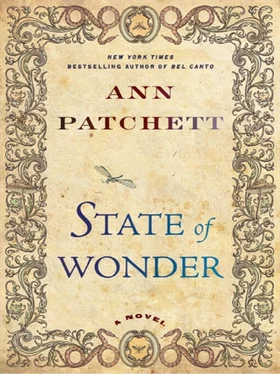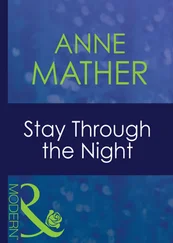“I’ll be fine,” Marina said. She was in motion now. She was as good as on the river.
“I don’t remember telling you to take Easter along,” Dr. Swenson said when they reached the old pontoon with a flat metal roof. The boy was standing behind her now, his hands on the wheel in an imitation of steering. There were boxes stacked neatly around the circumference and the boat sat low and even in the water.
“I don’t believe you did,” Milton said. He gave Marina his hand to board and in the moment she held his hand she thought about him the way she thought about the Bovenders. It would all be better if he would simply board the boat behind her.
Dr. Swenson tapped Easter on the shoulder and pointed to the lines, at which point the boy jumped off the boat and untied them. He curled his toes around the edge of the dock and pushed the boat away. He let it go so far that for one horrible instant Marina thought he wasn’t coming either, but then he leapt, his child’s bones filled with springs, and landed with both feet planted on the deck.
“Travel safely,” Milton said, and raised his hand up to them. He was the only person on the dock and he stood there as if they were the Lusitania . He was waving them back instead of waving them on.
Easter was firm at the wheel now. The child steered the boat out into a low swirl of current, a seriousness in his eyes as he scanned the wide horizon. Dr. Swenson, safe beneath the boat’s cover, closed her umbrella. Marina dropped her bag at her feet and held on to the railing. Milton receded but stayed in place, his arm raised as he grew smaller and smaller. Dear Milton. She waved to him. She hadn’t made it clear how grateful she was. After all those empty hours to spend in any conversation in the world, they had left in a matter of minutes with no discussion of where they were going or how long it would take them to get there or when they might think of coming back. But somehow none of that mattered anymore. Marina hadn’t understood the enormity of the river until she was on it. The sky was spread over in white clouds that banked and thinned depending on the direction she turned in. Some of the clouds had covered over the sun so for the moment it was cooler, and the breeze of their forward momentum kept the insects down. The birds shot out from the banks and cut over the water. Marina thought of Anders at the bow, his binoculars raised. How glad he must have been to finally leave this city. Marina never would have believed it until she was on a boat herself but the water was an enormous relief. “Beautiful,” she said to the one member of the party who could hear her.
“We always feel better heading home,” Dr. Swenson said.
There was traffic on the Negro, barges and tugs, water taxis with rotting thatched roofs where river swallows nested, dugout canoes containing entire families — sisters with babies and brothers and cousins and grandfathers and aunts holding open umbrellas, so many people crammed into one log that the lip of the boat sat nearly level with the surface of the brown water as one man in the back rowed carefully on. The smaller boats stayed near the shore, while a cruise ship, white as a sailor’s dress uniform, churned up the center aisle. Easter remained fiercely alert, his damp hair pushed back by the breeze, his eyes sweeping slowly side to side. He pulled the throttle to cut his wake in deference to the boats that were smaller, and he waved to those larger boats that cut their wake for him. Every appearance was that of an orderly world. Then the boy would turn and look behind him, and when he did he would nod to Marina and Dr. Swenson and they would nod back.
“Does he drive all the way?” Marina asked, not having any idea how far they were going.
Dr. Swenson nodded. “He likes it.” She was sitting on a box of canned hash while Marina stood. “What boy wouldn’t want to drive the boat? It gives him standing in the tribe. I drive or Easter drives, no one else. A few of the men have outboard motors that they’ve traded for over the years, but they’ve never captained a boat like this. It forces them to show respect when they see how much I trust him. He’s good with the engine, too. He’s figured it out.”
Marina was no judge of children but she would say that Easter looked too young to captain a boat or fix an engine or walk alone in a city at night, though not a mile back she had seen a child alone in a child-sized log who could not have been more than five, a spear lying over the bow, his paddle even as it went in and out of the water. “How old is Easter?”
Dr. Swenson looked up and gave a squint in Marina’s direction. “Shall I ask him?”
If Dr. Swenson had not been changed by time or experience or geography or climate, was it possible that Marina had not been substantively changed either? Was she in fact the person she had been in medical school, in grade school? “You’ll have to forgive me,” Marina said, and then set about restating the question. “I don’t know any more about the Lakashi than what you’ve written and you’ve written nothing about their ability to record time. Does anyone know how old anyone is? Do his parents know?”
“You make no end of suppositions, Dr. Singh. Is that a habit of yours? I have to say that was one thing I admired about Dr. Eckman: no preconceived conclusions whatsoever. A truly open mind is a scientist’s greatest asset. He must have been very thoughtful in his research. Had the circumstances been different I could have imagined asking him to stay on.”
Marina was not in the least bit unsettled by the praise for Anders. She knew the role of compliments in Dr. Swenson’s pedagogy: they were used not to raise one person up but to tap another down into place. She was only sorry that she didn’t have Anders to repeat it to, no doubt he would be shocked to hear such kindness after his death.
“You, however, suppose that Easter is Lakashi. He is not. I of course cannot be certain where he came from as he simply appeared in camp one morning and could neither hear nor speak. Were I to follow your example, I would suppose that he was Hummocca based on the shape of his head and the arrangement of his sinuses. The Hummocca have sinus cavities that are less pronounced than the Lakashi. Their faces are more curved, not quite so flat, but the difference is subtle. The Hummocca are somewhat smaller as well, and this goes to your original question about his age. I say all of this based on a single brief and unpleasant encounter with the tribe many years ago. Still, I find that fear can sometimes heighten our powers of observation to a point of great clarity. I remember the heads of the Hummocca so vividly it was almost as if I had dissected one.”
A double-decker tourist boat glided by without slowing and for a moment they were caught in its churning wake. As they pitched forward and back, rolling like a barrel in the little waves, Marina grabbed on to a pole and Easter raised his fist at the bigger boat. A tourist on the upper level pointed a camera in their direction. Dr. Swenson dropped her head for a moment, as if willing the other boat to sink through powers of concentration.
After the worst of the rolling had abated, Dr. Swenson lifted her head, her blue eyes bright and ringed in sweat. “Always buy a pontoon,” she said, panting lightly as if making an effort not to vomit. “You cannot imagine how hard that wake would have hit us had we not been in a pontoon. But I was making a point: Easter is a very small child, I would go so far as to say he is stunted. This could have been caused by a consistent lack of nutrition. It seems quite possible that no one was willing to give much of the tribe’s resources to a deaf child, or it could be that whatever illness rendered him deaf also rendered him small but now I am straying into what can only be called guessing, which is never helpful. Given his skills, his ability to learn, I would think him to be a twelve-year-old of normal, perhaps above-normal, intelligence. I’ll have a more precise judgment when he reaches puberty. The onset of puberty in the Lakashi male falls consistently between thirteen-point-two and thirteen-point-eight, a much narrower window than you find in American males. Whether or not this holds true of the Hummocca I am afraid I will never know. Do you have children, Dr. Singh?”
Читать дальше












